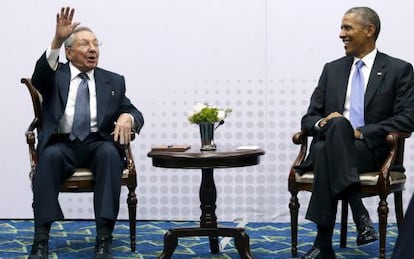Obama to visit Cuba on March 21 as part of regional tour
The last US sitting president to visit the island was Calvin Coolidge 88 years ago


US President Barack Obama announced on Thursday that he would travel to Cuba on March 21 and 22 and hold talks with Cuban President Raúl Castro during the trip.
“I'll travel to Cuba to advance our progress and efforts that can improve the lives of the Cuban people,” Obama said on his Twitter account.
“We still have differences with the Cuban government that I will raise directly. America will always stand for human rights around the world,” the president said.
The trip, which will be part of a broad multi-nation tour of Latin America, is expected to be a high-point toward ending 56 years of chilled relations between Havana and Washington. The two countries began building a framework to initiate a process of normalizing diplomatic relations in 2014.
“We still have differences with the Cuban government that I will raise directly.”
Last July, Cuba and the United States formally established relations. A month later, John Kerry became the first US Secretary of State in more than half a century to go to Cuba, where he helped inaugurate the reopening of the US Embassy in Havana.
With this trip, Obama hopes to make history by becoming the first sitting president in more than 80 years to travel to the island. In 1928, US Republican President Calvin Coolidge visited Havana to speak at the Sixth Annual International Conference of American States, which would later become the Organization of American States (OAS). Former US President Jimmy Carter visited Havana in 2002 but he was no longer in the White House.
In an interview with Yahoo! News last December, the US leader said he wanted to go to Cuba but only if the conditions were right.
“If I go on a visit, then part of the deal is that I get to talk to everybody,” Obama said. “I’ve made very clear in my conversations directly with President [Raul] Castro that we would continue to reach out to those who want to broaden the scope for, you know, free expression inside of Cuba.”
Outside pressure on Congress has been growing to lift the five-decade-old trade embargo
This will be the third time that Obama and Castro meet face to face.
But even though the trip will capture the world’s attention, there are some political risks involved. Obama will arrive in Cuba to try to cement his presidential legacy but without accomplishing what has been a sore point between the two sides.
Cuba has said that full diplomatic relations cannot be achieved unless the US economic and trade embargo is lifted.
Even though Obama has eased some restrictions for US citizens traveling to Cuba and agreed to allow direct flights between both nations, it would take an act of Congress to lift the more than 55-year-old embargo.
There have been various bills filed in the House of Representatives calling for the end of sanctions, but for the moment, its sponsors do not have enough support to push them through their respective committees.
Obama’s trip to Cuba will no doubt became a major issue in the US presidential race
Obama could fail in accomplishing full diplomatic relations with the Communist island government, but the outside pressure on Congress has been growing.
US air carriers have already filed their paperwork to obtain licenses to begin flights to Cuba by the fall. Vacation cruise lines have also submitted their petitions to include Cuba as one of their stops in the Caribbean.
On Thursday, US Trade Secretary Penny Pritzker and Cuban Trade Minister Rodrigo Malmierca will finalize their second round of talks aimed at pushing for bilateral trade.
While they both said at the beginning of their meeting that there were a lot of issues to be discussed, both officials acknowledged that there is pressure by US businesses who do not want to miss any opportunities in Cuba.
Obama’s trip to Cuba will no doubt become a major issue in the US presidential race.
While some candidates – such as Republican senators Marco Rubio and Ted Cruz, who are both of Cuban origin – have criticized Washington’s policy toward Havana, the issue has mostly been ignored in debates and campaign speeches.
But the candidates are aware that there is broad support by US citizens for the normalization of relations with Havana, and they know how unpopular – not to say impossible – it would be to halt the process initiated by Obama.
English version by Martin Delfín.
Tu suscripción se está usando en otro dispositivo
¿Quieres añadir otro usuario a tu suscripción?
Si continúas leyendo en este dispositivo, no se podrá leer en el otro.
FlechaTu suscripción se está usando en otro dispositivo y solo puedes acceder a EL PAÍS desde un dispositivo a la vez.
Si quieres compartir tu cuenta, cambia tu suscripción a la modalidad Premium, así podrás añadir otro usuario. Cada uno accederá con su propia cuenta de email, lo que os permitirá personalizar vuestra experiencia en EL PAÍS.
¿Tienes una suscripción de empresa? Accede aquí para contratar más cuentas.
En el caso de no saber quién está usando tu cuenta, te recomendamos cambiar tu contraseña aquí.
Si decides continuar compartiendo tu cuenta, este mensaje se mostrará en tu dispositivo y en el de la otra persona que está usando tu cuenta de forma indefinida, afectando a tu experiencia de lectura. Puedes consultar aquí los términos y condiciones de la suscripción digital.








































